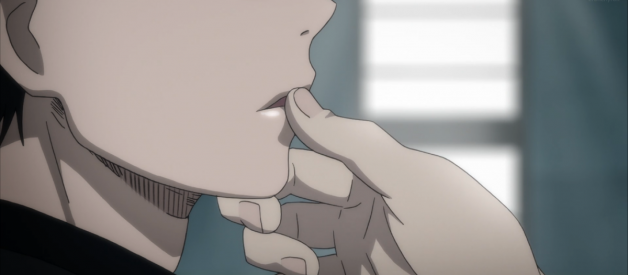I?ll save you the trouble of digging for my position: Yes, Yuri on Ice is gay, and it is as explicitly gay as the industry it depicts, which is to say, obviously but with some restrictions.
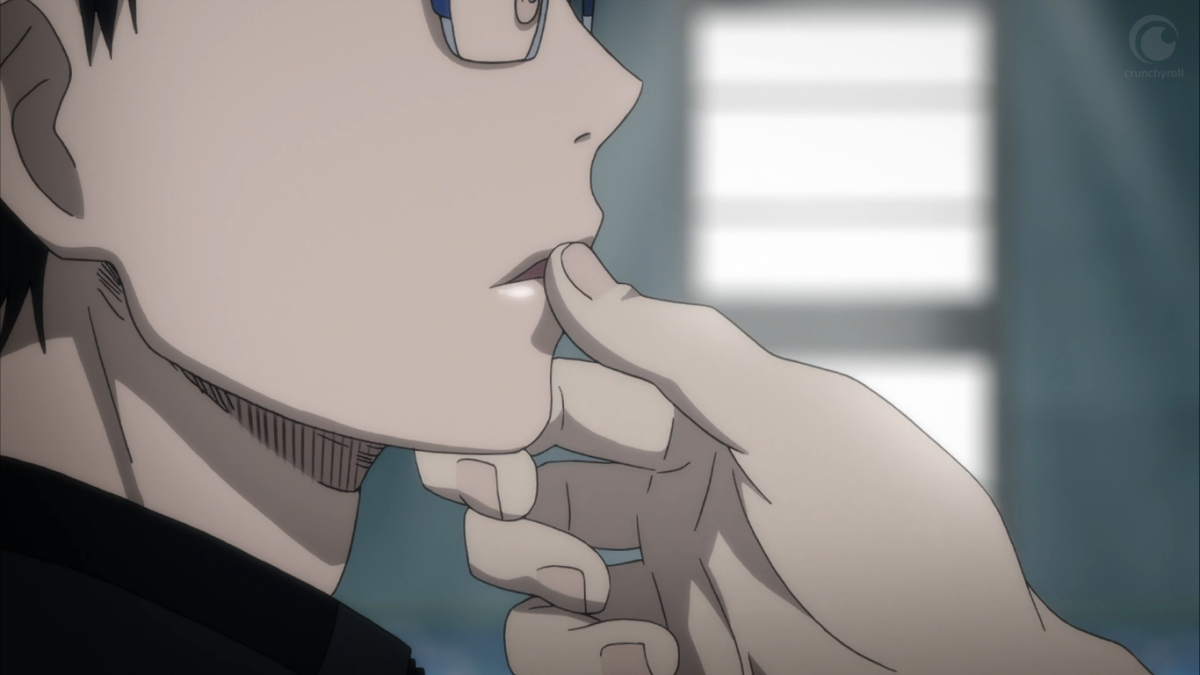 Very straight.
Very straight.
Figure skating has a LOT of gay men in it, but skaters can?t be too outspoken about their identities. Embrace it, and you end up getting the backhand from the skating gatekeepers like Johnny Weir did. I?m no expert on the anime industry or the minutiae of Japan?s censorship/decency regulations, but it seems pretty clear you?ve gotta stay in the lane of plausible deniability if you want to depict characters as gay. In episode 7 of Yuri on Ice, our main characters kissed ? with an obscuring caveat ? but as I?d argue with most sports anime, kissing is probably the least gay thing that happens.
I feel like it?s important to address the ?queerbaiting? debate going right into this. Yes, a lot of anime, especially sports anime, would fall into whatever approximately equivalent category it has for what we know as queerbaiting. It?s still not the same, but for many, the result is what matters: subtextual romance that?s never allowed to be confirmed textually. It renders homosexuality invisible, and that?s dangerous. I think the important difference is in the creator/consumer contract. For western instances of queerbaiting, subtextual gay romance is played up with the intent of luring in the fans who want to see it, suggesting that textual gay romance could be possible ? but it wont be, and the creators may not just deny that text, but will go out of their way to erase it, ?no homo? it, or even make fun of the audience for having hope for it at all.
In anime, and again, this is from my understanding as a western consumer, there is an understanding. Yes, the subtext is capitalized on ? fujoshi fandom is an industry and many anime float because of their dual appeal as shonen sports as well as ?fujoshi bait.? But generally the fandom is under no illusions about how it will play out. Sports anime gets to flaunt its subtext, sometimes to ridiculous levels because it will never textualize it. The fans know this, and I don?t think they?re being disrespected in the way, say, a Sherlock fan might have been, because many creators ? and an increasing number of female directors ? appreciate them.
Let?s work backwards from Yuri on Ice. Probably one of the best anime of 2016 was Showa Genroku Rakugo Shinjuu, and feels a lot like an immediate predecessor to Yuri on Ice as far as depicting gay men in anime. In Rakugo we follow the memories of Kikuhiko, a master Rakugo storyteller, through a framing device as he tells his life story to his protegees. He was a disabled child raised by geisha, kicked out and apprenticed to a storyteller alongside another kid, his human opposite Sukeroku. Sukeroku is macho, brash, messy, and womanizing, while Kikuhiko is gentle, feminine, and strict. He finds his storytelling voice when he realizes he is suited for feminine roles. There?s an obvious problem with the systematic conflation of homosexuality with femininity, but for many gay men that is how they express themselves. And, as we see in figure skating, some industries that allow men to express themselves in feminine ways can attract gay men for that reason.
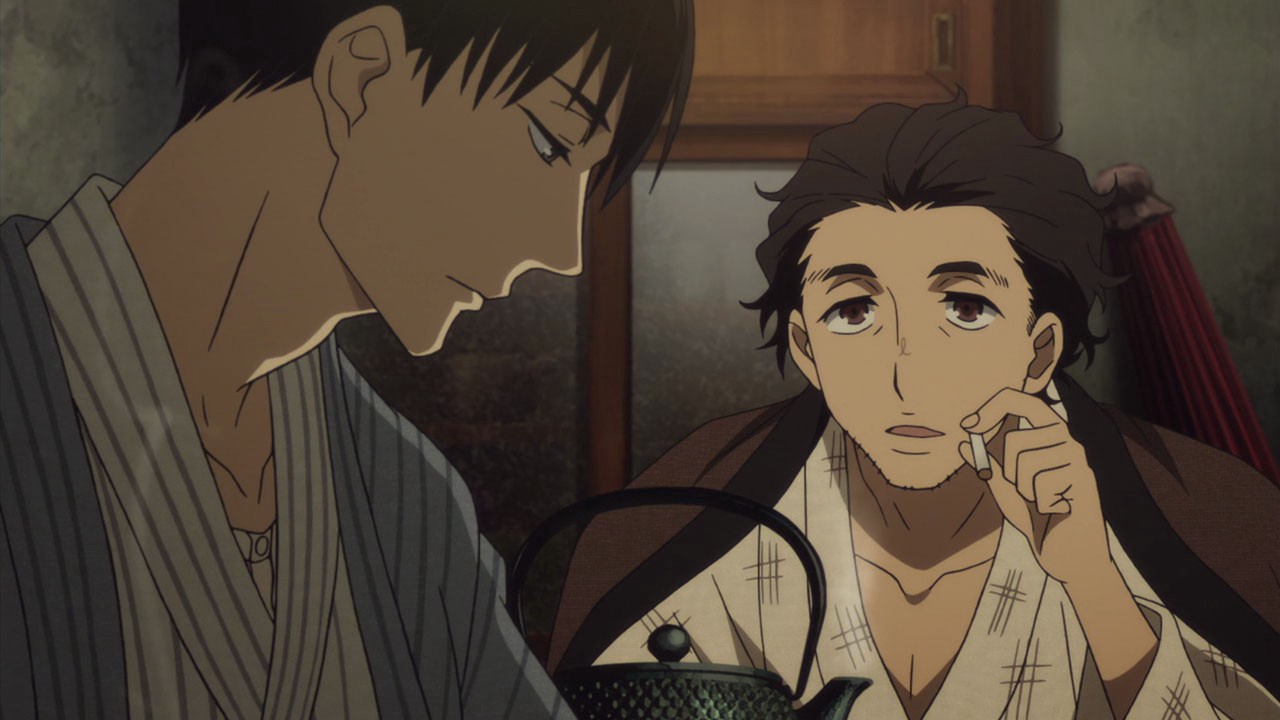 Kikuhiko and Sukeroku
Kikuhiko and Sukeroku
Though its never said outright, it seems pretty clear that Kikuhiko is gay. He is not comfortable with the macho, he doesn?t want to have sex with or marry women, and his attachment to his male best friend and rival is obvious and pining and frustrating. This doesn?t make it queerbait, or fujoshi bait, or anything of the sinister sort. It?s just subtle. Rather than being subtle for reasons of censorship, it?s for the art of it, for consistency? Kikuhiko keeps his sexuality close to his heart in his world, so speaking the name wouldn?t be appropriate in the anime. It makes sense narratively.
I?m not the first, by a long shot, to draw the parallel between Kikuhiko and Yuri, who has a similar awakening to embracing the feminine.
Through some fairytale magic (in the form of a youtube video) Katsuki Yuri?s figure skating hero, the Russian Victor, comes to his home and declares himself Yuri?s new coach. Yuri is overwhelmed, and Victor immediately tests his adaptability by making him perform a program outside of his comfort zone: on the theme of Eros, or sexuality. Yuri is a sweet little bean, gentle and kind, and while he wants to please his coach/hero, he can?t get the hang of the program because he can?t get into the shoes of the womanizing Casanova that is the main character of the performance.
When picking a costume from Victor?s collection for his piece, he has a breakthrough. He wants the outfit with the skirt, which Victor says he wore to ?evoke both the male and female genders at once.? Yuri than rushes to his ballet teacher?s home and asks her to teach him to ?move in feminine ways.? He proceeds to perform the program playing the part of a seductive woman instead of the womanizing man, and succeeds in stunning the audience and his coach.
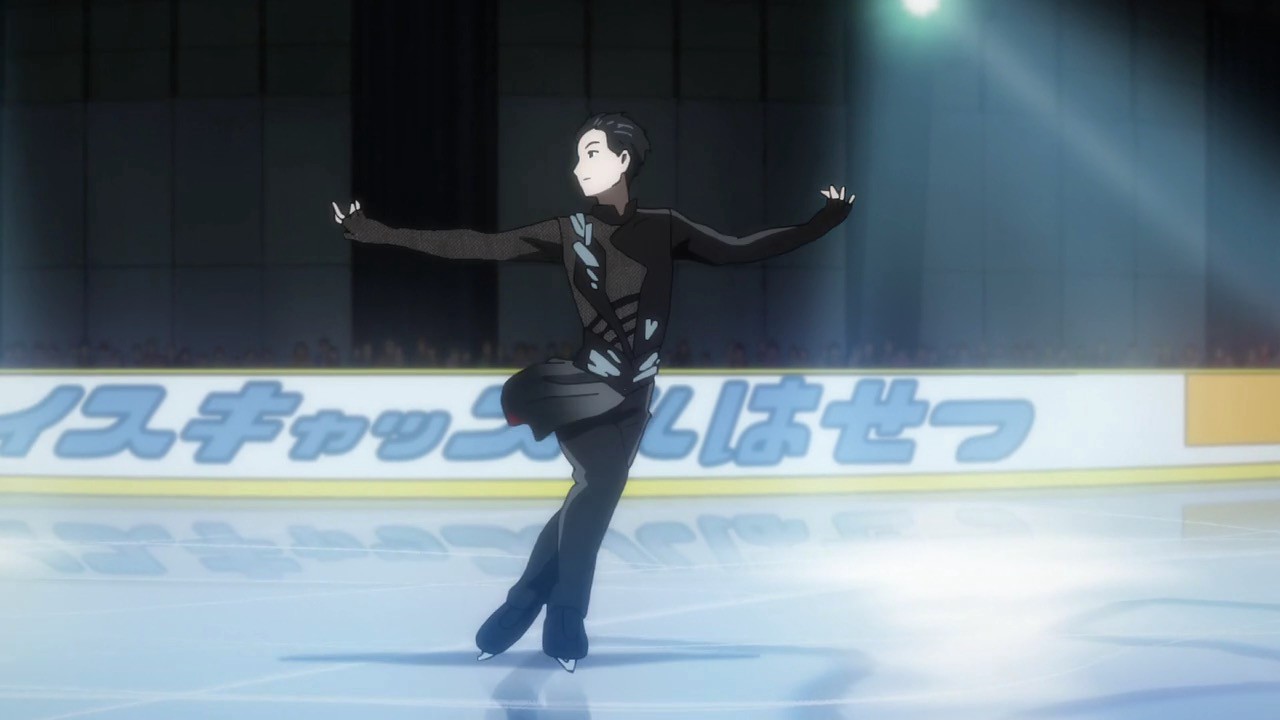
This is just a stepping stone, not an identity that defines his performing after that, but the parallel is clear. The feminine, for many, can be an entry point for connecting yourself to your craft.
Yuri on Ice is about a few things. Firstly, it?s about a number of adult professionals trying to figure out their place in their industry. Yuri is a talented but unsuccessful skater nearing the end of his physical viability, and Victor is a champion skater four years Yuri?s senior trying to ?find himself? via a coaching detour. They are contrasted with a young star, Yuri Plisetsky (aka Yurio,) who is just starting his rise in the world. While it?s firstly about that, though, it?s foremostly about Yuri and Victor?s relationship. And that, paired with the fact that the show cleverly implies character?s homosexuality, makes it, to me ?officially? gay. More on the hazard of ?officially? as a designation later on.
Victor is a bit of a doofus. His ex-coach puts it bluntly: He?s left his skating career to be a coach all of a sudden, but he is not equipped to be a coach. Explicitly ?He doesn?t care about anyone but himself.? And that seems to be true. He?s not being Yuri?s coach for Yuri, really. He?s being Yuri?s coach to figure himself out. But he?s got the confidence of a man who?s a wild success at the one thing he did, and is probably not emotionally equipped to support another person. This becomes abundantly obvious in episode 7, which I?m going to talk a lot about now.
In episode 7, Victor kisses Yuri. On the ice. And while there is still debate as to whether they ?actually? kissed, listen: They did. The moment of lip contact was obscured not to tease but probably to maintain that plausible deniability I mentioned earlier. Probably can?t show the actual kissing or the show might get booted off of TV. I don?t know. But they did use every device humanly possible to make it clear that they kissed. Glistening lips, the background audio cut-out, the fact that Victor was ?surprising? him, the reactions of his family and friends. This was intentional.
But the kiss isn?t the point. The point is that they?re in a relationship well before that. The coach/student relationship, for sure, but Yuri declares his love for Victor naught but a few episodes into the show. On live television. It?s poetic and dramatic but absolutely CLEAR. He couldn?t be more clear: He says ?I love Victor and my love for him has changed me and I?m using that feeling to power my skating season.? The episodes that follow guide us through him sorting out the realities of his relationship to Victor with every subsequent performance. Does he lust for him? Does he want to posses him? It?s not until episode 7 that he realizes ?Oh. He?s not a god after all. He can be bad at things. And I still love him.? His hero worship shatters. In a good way.
And then Victor kisses him.
And this isn?t ?reading too much into it? or ?fujoshi goggles? or whatever words we like to use to dismiss femmes who want to examine things critically and seriously through their own lenses. This is what happens. Right there, on the screen.
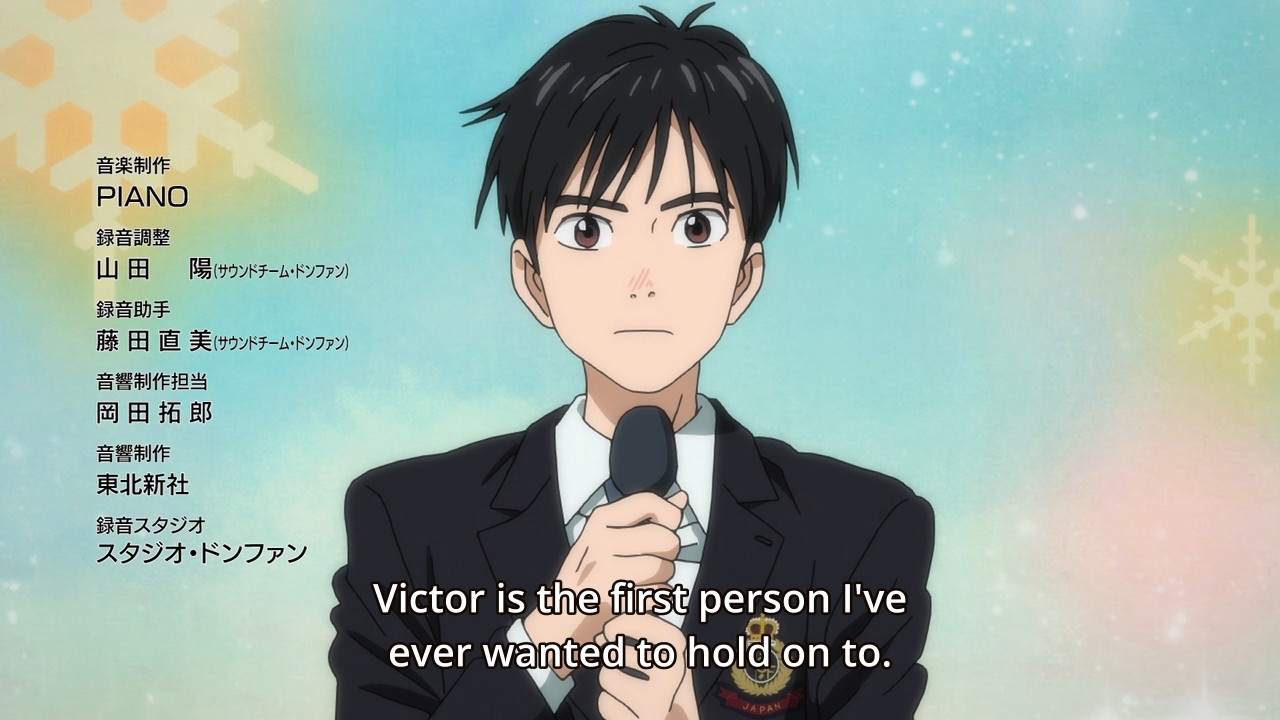
So back to the question of ?is it actually gay: That needs to be answered with questions right back: How do you define ?actually gay?? What is the victory outcome to this question?
That?s the important part to take away, both in the context of Yuri on Ice and other sports anime. How we define a narrative as ?successfully gay,? should be expanded to encompass the nuance that needs to be employed in anime. People really like to rag on Free! Iwatobi Swim Club as ?fujoshi bait,? but in many ways that show felt ?more gay? than any of the explicit BL that?s gotten its own anime adaptation. Free! is about teenage boys and their relationships and emotions and their bonds with one another. No one kisses, no one says the word gay, but it still had meaning to a lot of the queer people who watched it. A kiss wouldn?t have expressed half of the intimacy as some of the glances and hugs and conversations did. And they can have that without being shamed for liking it; they can have that while being trusted to examine it for what the reliance on subtext MEANS. Don?t think we don?t. We have to! Every damn day. We know how to critically examine our representation. We can?t survive if we don?t.
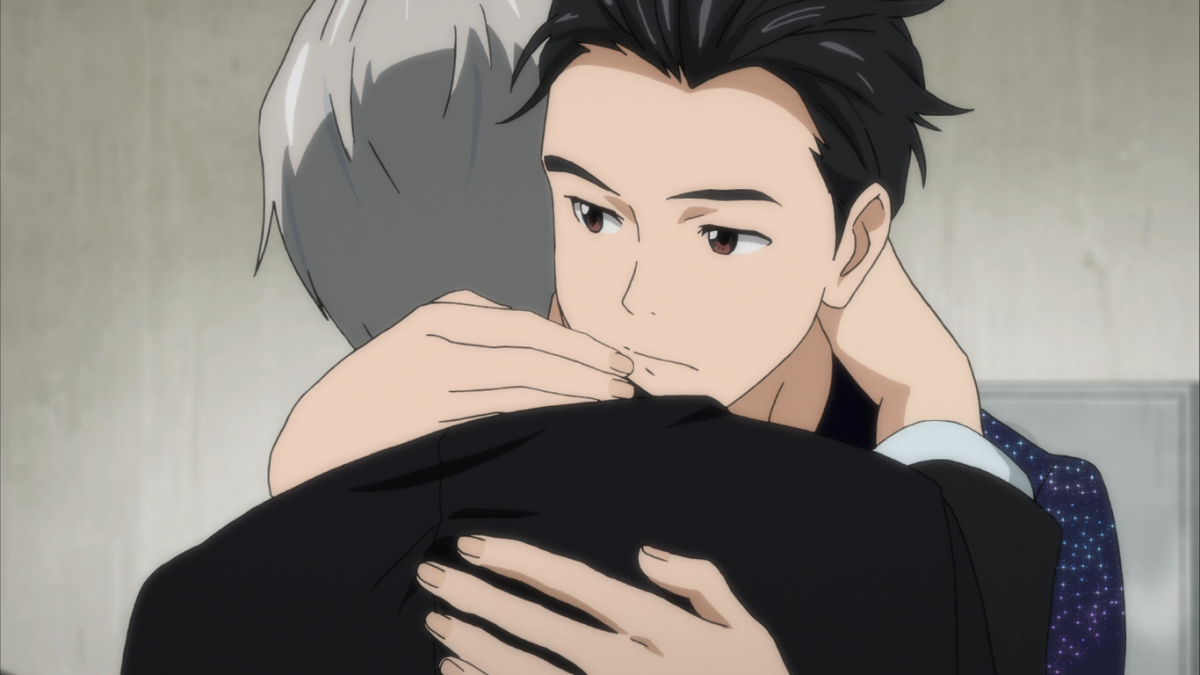
Anyway, if your measure for whether an anime is ?actually gay? is whether they visibly kiss or come out on screen, no. You?re not gonna find a lot that will satisfy you. You?re entitled, of course, to your own standards. You?re absolutely entitled to not watch the things that don?t fulfill your standards, and I will not judge you for it. It?s hard being queer in 2016 and you have to consume media in a way that makes sense to you. But I am going to do the same. If I can look at a show and reasonably say ?I?m being trusted to understand that these men are in a homoromantic relationship, or identify as homosexual,? then that show is gay to me.
There are also, I think, a lot of thoughtful references to the silent existance of homosexuality in the skating industry. Specifically, in episode 6, a certain comfort with homosexuality seems to be implied by the skaters interactions with one another. When fellow skater Pichit posts a picture of a naked, drunk Victor hanging onto Yuri?s neck to Instagram, Yuri is not worried anyone will think he?s gay (because that wouldn?t be a shock,) he?s worried he will be seen as fooling around before a performance instead of taking it seriously. Later, another skater, Christophe, grabs Yuri by the butt in greeting, and makes an obviously layered comment about Yuri?s coach ?working him too hard.? This is a pretty clear double-entendre that doesn?t phase Yuri at all, nor did he find the need to question the ass-grabbing. And as a final example, in the latest episode, Victor is shown as a younger skater wearing an iconic outfit (rather a combo of two iconic outfits) worn by the aforementioned Johnny Weir. If that?s not meant to suggest Victor?s presence as a gay man in figure skating, I?m hard pressed to know what anything means. There are a lot of references to different skaters in the show, but Weir?s outfits seem to inform several of them. I think it?s significant.
The remaining question is probably about fanservice. This, I would argue, is more about what is normal about anime in general, and not just ?fujoshi bait.? Nearly every anime, whether moe or yuri or BL or sports or otherwise, capitalizes on incongruous erotic tension. Fans like it when characters fight, touch, and smile lovingly at one another. They like it when characters fall on top of one another in compromising positions, or get too close and blush. I?m compelled to urge people who complain about fanservice in female-aimed properties to maybe question why it?s only female-aimed properties that don?t get the pass on that.
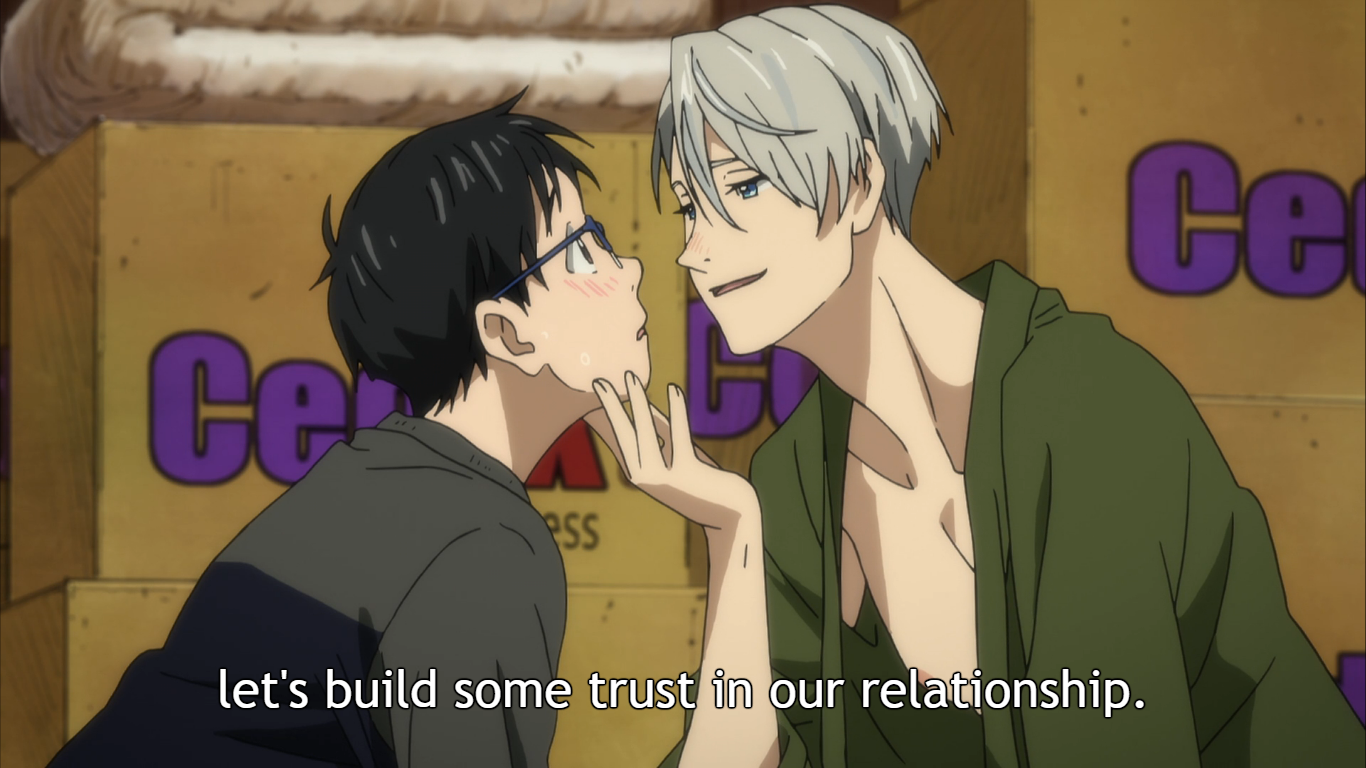
But then I would also make a narrative defense for ?fanservice? in Yuri on Ice. Victor is naked a lot. He touches Yuri a lot. He invades Yuri?s personal space. He declares, repeatedly, that he wants Yuri to let him sleep with him. It may be fanservice. And they sure used every clip of it they could in the promos for the show before it aired. But I think it maybe makes sense. Victor tends to make a show of affection instead of genuinely expressing it. Just as he?s playing at being a coach, he?s doing what he thinks is appropriate to entice and motivate his student. He?s very intimate with Yuri throughout the whole show, but it?s not until episode 7, I think, that he actually, truly, shows affection for Yuri. Actual, romantic affection. By kissing him.
And if that?s not gay?
I?m not sure what is.
